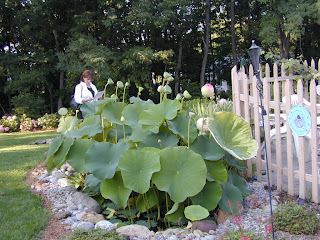
Here's my Dad, who is one heckuva vegetable gardener, standing in his squash patch. He planted this year's crop of 'Sunshine' winter squash on the spot where his compost bins stood last season. Imagine if he had planted his tomatoes there instead...
Rochester, New York



 completely strip a plant of all foliage and flowers. The adults are easily recognizable – about ½ long and bright red. The larvae look a bit like slugs, but since they cover themselves with their excrement, before long they look mostly like insect poo.
completely strip a plant of all foliage and flowers. The adults are easily recognizable – about ½ long and bright red. The larvae look a bit like slugs, but since they cover themselves with their excrement, before long they look mostly like insect poo.